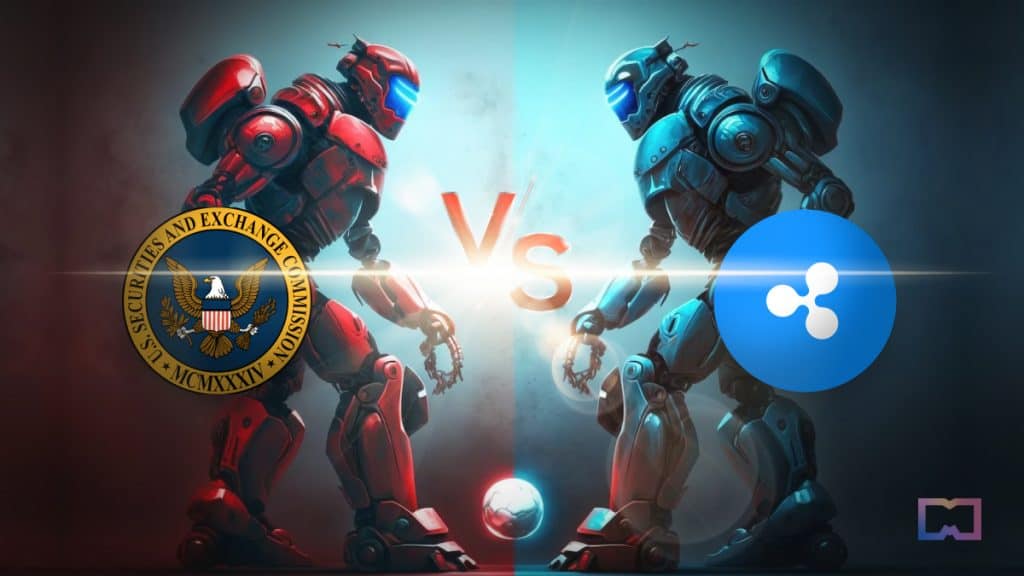Ripple vs SEC: Everything You Need to Know


In Brief
Ripple secured a partial win in its longstanding court battle with the SEC late last week.
Following the legal triumph, crypto exchanges Coinbase, Kraken and Bitstamp started relisting XRP.
XRP’s price shot up over 60% last Friday and has remained stable since
The buzz surrounding Ripple’s partial victory in its seemingly endless court case with the SEC continues as SEC commissioner Gary Gensler expressed his disappointment on Monday with the district court’s ruling.

“We’re pleased from that decision recognizing the importance of protecting investors on the institutional investors,” Gensler said at the National Press Club luncheon on Monday. “While disappointed on what they said about retail investors, we’re still looking at it and assessing that opinion.”
The longstanding legal battle between Ripple and the SEC has been a highly consequential event in the crypto space, capturing the keen interest of investors, enthusiasts, and regulatory bodies. Prior to last week’s verdict, many had been eagerly anticipating a favorable resolution, lending an air of suspense and significance to the unfolding proceedings.
What is Ripple?
Ripple Labs, commonly referred to as Ripple, is a technology company primarily focused on developing blockchain-based solutions to make cross-border payments and transfers faster and more efficient. The company developed the XRP Ledger, a decentralized blockchain technology that enables low-cost, real-time international transactions. Ripple also issued a native cryptocurrency XRP.
The company was founded by Chris Larsen and Jed McCaleb in 2012. Larsen is a prominent figure in the fintech industry. He previously co-founded E-Loan and Prosper Marketplace. McCaleb is best known for founding one of the first Bitcoin exchanges, Mt. Gox, in 2010. The exchange was shut down in early 2014 after a series of security breaches and mismanagement, resulting in the loss of large amounts of customer funds. McCaleb served as Ripple’s CTO until 2013.
Ripple’s legal issues with the SEC
In December 2020, the SEC filed a lawsuit against Ripple Labs, Chris Larsen, and Brad Garlinghouse (then CEO of Ripple). The SEC alleged that Ripple’s sale of XRP tokens since 2013 amounted to an unregistered securities offering, making it subject to federal securities laws.
Since then, Ripple’s legal battle with the SEC has revolved around whether XRP should be categorized as a security. The SEC argued that XRP was, in fact, a security, given the manner in which it was initially distributed and sold by Ripple as an investment contract, akin to traditional securities like stocks and bonds. This classification would subject Ripple to a plethora of regulatory requirements and potential penalties for non-compliance with securities laws.
Ripple and its executives argued that XRP is a decentralized cryptocurrency, independent of Ripple Labs, and should not be treated as a security. They emphasized that XRP served as a utility token, specifically designed to facilitate international transactions on the XRP ledger.
The legal teams of both parties fought in court over these points of contention and the case became a focal point for the broader debate surrounding the regulatory treatment of cryptocurrencies and the blurry line between securities and utility tokens.
In the years that followed, numerous legal motions, hearings, and documentation requests flew back and forth between the SEC and Ripple, further fueling speculation about the potential outcome and its impact on the cryptocurrency industry.
Timeline of legal events
- Dec 22, 2020: The SEC files a lawsuit against Ripple Labs, Chris Larsen, and Brad Garlinghouse, alleging that they conducted an unregistered securities offering of XRP. Coinbase delists XRP.
- Jan 2021: Brad Garlinghouse, CEO of Ripple, announces that the company plans to challenge the SEC’s allegations in court. Ripple files its response to the SEC’s lawsuit, reiterating its position that XRP is not a security and that the token has value and utility.
- Mar 2021: The SEC requests an immediate trial. Ripple seeks SEC internal records of the regulator’s views on crypto. Judge Sarah Netburn tells SEC that XRP has both utility and currency value.
- May 2021: A legal memorandum is filed by the defendants, asking the court to dismiss the SEC’s case based on several legal arguments.
- Aug 2021: The court grants Ripple’s motion to compel the SEC to produce documents related to its internal discussions on whether XRP, Bitcoin, or Ether should be classified as securities.
- Oct 2021: Both parties file a joint motion for an expert discovery deadline of January, allowing both Ripple and the SEC to call upon expert witnesses to provide opinions, analyses, or testimony in the case.
- Jan 2022: The expert discovery is postponed for a month, scheduled to end on Feb 28.
- Sep 2022: The Chamber of Digital Commerce files an amicus curiae (a non-party individual or organization allowed to aid a court by providing relevant information, expertise, or insights pertaining to the case’s issues) brief to the court in support of Ripple.
- Oct 2022: A judge on the case orders the SEC to release the “Hinman documents,” which contained emails linked to SEC’s Director of Corporation Finance William Hinman’s and other SEC officials discussing his 2018 speech, in which he said that ETH was did not look like a security.
- Dec 2022: SEC tries to block the release of the Hinman documents.
- Jun 2023: The Hinman documents are unsealed and publicly released.
- Jul 2023: Ripple scores a partial win as Judge Torres rules that XRP is not a security when sold to retail investors, but is a security when sold to institutional investors.
The aftermath
Last Thursday, the District Court for the Southern District of New York said the “offer and sale of XRP on digital asset exchanges did not amount to offers and sales of investment contracts.” Nevertheless, the judge determined that Ripple Labs’ sale of its XRP cryptocurrency to institutional investors constituted a breach of securities regulations.
The verdict appears to be contradictory. According to James Carlson, an adjunct securities regulation professor at New York University, securities laws were originally crafted to safeguard individual investors who may lack the ability to protect themselves. Carlson pointed out that “big institutional investors don’t require the safeguards provided by securities laws,” and thus, this ruling effectively flips the underlying philosophy of these laws on its head, as reported by The Information.
Despite that, the ruling still represented a victory not just for Ripple as the crypto and web3 community saw it as cause for celebration. This victory held greater significance, particularly in light of the recent securities law violations charges brought against Binance and Coinbase by the SEC.
W.
— Coinbase 🛡️ (@coinbase) July 13, 2023
W for @ripple.
W for the industry.
W for the builders.
W for a clear rulebook.
W for updating the system.
Oh, and XRP is now open for trading.
Following the court ruling, XRP’s value soared over 60% in the 24 hours from Thursday to Friday, according to CoinMarketCap. According to CoinGecko, the trading volume of XRP on Upbit hit $2.7 billion during that period—an increase of 41%. The token’s value went from $0.47 to its current price of $0.76 at the time of writing this.
Crypto exchanges including Coinbase, Kraken, and Bitstamp started relisting XRP last Friday while Gemini tweeted that it is “exploring the listing of XRP for both spot and derivatives trading.” Coinbase stock also saw a surge of 24% on Thursday, reaching a closing price of $107.
Although Ripple’s legal triumph marks some progress for other crypto projects that face similar classification challenges from the SEC, the outcome of their ongoing legal battle remains uncertain as the industry awaits for the SEC to release a clear rulebook.
Could the court’s ruling be appealed?
In an essay published last Friday, former chief of the SEC Office of Internet Enforcement, John Reed Stark, believes that the court’s decision on Ripple “will likely be appealed at some point.”
Stark questioned why tokens are securities when sold to institutional investors but “somehow miraculously transform and become “not securities” when those institutional investors or the issuer itself, sell the tokens on Coinbase or Binance.”
He also criticized the court for establishing a class of quasi-securities that discriminates and transforms based on the investor’s level of sophistication or knowledge when purchasing the tokens.
In that context, Stark stated that the ruling appeared to be counter-intuitive, inconsistent with SEC case law, and unprecedented. It essentially asserted that Ripple’s marketing efforts and business operations were too complex for an ordinary retail investor to grasp, rather than an institutional investor who would have understood the true implications of buying a token.
He criticized the court for assuming that retail investors are “stupid” and insulting their intelligence. “Securities laws were specifically designed to protect individual investors, based on the idea that they can’t fend for themselves and that ripping off investors can cause cataclysmic market events (like the crash of 1929). The Ripple decision turns this notion on its head,” he explained.
Drawing a comparison to stocks, Stark explained, “Stock is always stock – it can’t transmogrify into ‘not stock.'” He expressed his belief that the SEC would appeal the Ripple decision to the 2nd Circuit, where the District Court’s rulings regarding “programmatic” and “other sales” would be overturned.
Disclaimer
In line with the Trust Project guidelines, please note that the information provided on this page is not intended to be and should not be interpreted as legal, tax, investment, financial, or any other form of advice. It is important to only invest what you can afford to lose and to seek independent financial advice if you have any doubts. For further information, we suggest referring to the terms and conditions as well as the help and support pages provided by the issuer or advertiser. MetaversePost is committed to accurate, unbiased reporting, but market conditions are subject to change without notice.
About The Author
Cindy is a journalist at Metaverse Post, covering topics related to web3, NFT, metaverse and AI, with a focus on interviews with Web3 industry players. She has spoken to over 30 C-level execs and counting, bringing their valuable insights to readers. Originally from Singapore, Cindy is now based in Tbilisi, Georgia. She holds a Bachelor's degree in Communications & Media Studies from the University of South Australia and has a decade of experience in journalism and writing. Get in touch with her via [email protected] with press pitches, announcements and interview opportunities.
More articles

Cindy is a journalist at Metaverse Post, covering topics related to web3, NFT, metaverse and AI, with a focus on interviews with Web3 industry players. She has spoken to over 30 C-level execs and counting, bringing their valuable insights to readers. Originally from Singapore, Cindy is now based in Tbilisi, Georgia. She holds a Bachelor's degree in Communications & Media Studies from the University of South Australia and has a decade of experience in journalism and writing. Get in touch with her via [email protected] with press pitches, announcements and interview opportunities.

















































